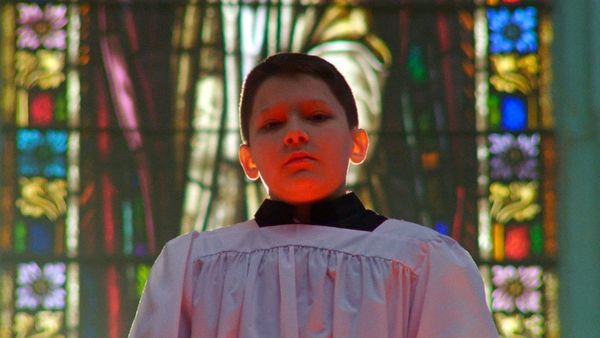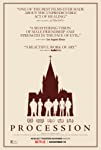Eye For Film >> Movies >> Procession (2021) Film Review
Procession
Reviewed by: Jennie Kermode

With former Pope Benedict XVI now amongst those accused of covering it up, virtually no-one is still trying to deny the epidemic of child abuse in the Catholic Church, but whilst efforts focus on identifying perpetrators and their allies, less attention is paid to the ongoing needs of survivors. Even on the occasions when justice is secured through the courts, they may receive little or no help to deal with post traumatic stress disorder or similar problems. This documentary, which has received multiple award nominations, follows six men’s journey through drama therapy as a process of dealing with unwanted memories and ongoing associated trauma.
Repressed memory is a phenomenon frequently misrepresented in popular media, and cinema is no exception. Rather than forgetting their experiences outright, traumatised people tend to repress the process of actively thinking about them, pushing them to the back of their minds until pressure builds up and they become too much to bear. They can also be affected by triggering – a term likewise misunderstood – when something mentally associated with the original trauma (but not necessarily traumatic in itself) prompts memories to resurface abruptly, often overwhelmingly. This can happen at any time, which is frightening in itself and sometimes dangerous (for instance, when people suffer panic attacks whilst driving). This makes getting those memories out and reducing their power imperative, even though it’s distressing in itself. Social factors such as the shame associated with suffering sexual violence, and spiritual factors such as the fear of going to Hell, can compound that distress.
An understanding of the practical, biological issues involved in all this is what originally drew filmmaker Robert Greene to this project. When he came across attorney Rebecca Randles, who had investigated abuse allegations, he contacted her to ask if her clients would be interested in making a film as a means of exploring and exorcising their memories. Drama therapist Monica Phinney joined them to provide appropriate structuring and support, and extraordinarily grounded child actor Terrick Trobough stepped in to help them restage scenes from their own youth.
The result of all this is a series of such scenes, supported by extensive observation of the process through which they were created, footage of group therapy discussions and individual reflections on the experience of participation. There’s a frankness about it all which may shock some viewers, but in fact it’s quite common for survivors to speak in this way, setting aside additional emotional burdens. The emotion comes through in the re-enactments, and anyone who doubted the effectiveness of drama therapy will be astounded by these. They give the men the chance to express, at long last, all the feelings they repressed in the moment – to say what they wanted to say as if speaking directly to their abusers. This is not the anger of outsiders: lawyers, journalists, irate members of the public. These are the delayed voices of children asserting their basic humanity.
Greene is patient. In places, viewers will need to be patient too. It’s not easy for the men to reach the point where they can speak. The exhausting effort required to do so is apparent in the group sessions and one-to-ones. it’s important that we see this. There will be viewers who are going through a similar thing, including some who have not, as yet, shared their stories with anyone. Procession gives outsiders an intimate view of the damage done by abuse. It gives survivors a chance to see that there is hope: that the pain and the panic and other debilitating symptoms can recede, and there can be a life afterwards. The friendships built in this particular case give the film warmth and positivity despite its difficult subject matter, and it offers tools to those still trying to make their way alone.
Sensitive, astute and powerful, Procession seems to represent a willingness to move forwards in the wider public conversation about abuse – to understand that justice alone is not enough, and to begin to provide more widespread opportunities for healing.
Reviewed on: 22 Jan 2022















